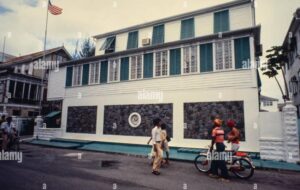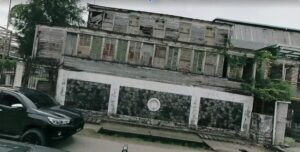“Never ascribe to malice that which is adequately explained by incompetence.” Hanlon’s Razor
In September 1978 I was a Corporal serving as a Watchstander at the Marine Detachment in Santiago, Chile, when I received orders that I was being transferred to the Marine Detachment in Georgetown, Guyana. I arrived on 22 September, a week before I turned 21.

At that time the Embassy was still located on Main Street in Georgetown, but the Marine House – the residence for the Marine Security Guards (MSG) – was across town. We had a right hand drive Ford Transit van for transportation between the Embassy and the Marine House. The detachment in Georgetown was considered a “hardship” assignment, one which had been deemed to have difficult conditions. There were two key reasons for this classification: the extreme poverty of the country, and a government that was hostile to America. Another unusual feature of the detachment – a State Department acquiescence to a demand from the local government – was that MSGs did not wear uniforms. Instead we wore business attire, a sports jacket, slacks and tie. As I recall, only three Marine detachments at that time did not wear uniforms: those assigned to Georgetown, Guyana; to Havana, Cuba; and to Beijing, China.
I had grown up in the Bay Area of California, so I had heard of Jim Jones and Peoples Temple from news sources, but I didn’t learn about Jonestown until after I arrived in Georgetown. It was common knowledge in the Embassy that relations with the Jonestown community were sensitive and strained. I recall an Embassy official – I believe it was Doug Ellice – talking about needing to visit Jonestown. One responsibility of the U.S. Embassy is to develop contingency plans to protect all American citizens in the country. Apparently the plan was out of date and needed updating. But the Jonestown community wasn’t cooperating.
Despite the Embassy’s very small staff, US Ambassador John Burke often spoke of the importance of the work we were doing. And he was right, especially in light of the events of 18 November 1978.
I arrived for the midnight shift that night, a shift normally spent all alone, to find the Embassy in a maelstrom of activity. Everyone on the Embassy staff, from the Ambassador on down, to my superior the Marine Noncommissioned Officer in Charge (NCOIC) Staff Sergeant Larry Snyder was there. At that time we had a dearth of information. We knew that there had been a massacre of Congressman Leo Ryan and others at a remote jungle airstrip. We knew that it wouldn’t be possible to send any help to Port Kaituma until daylight. What we didn’t know was whether the attack on the congressional party 125 miles away was the precursor to an assault on the Embassy, and we went into a heightened state of readiness.
One of my duties on the midnight shift was to operate the Embassy’s telephone switchboard, and that night, it was flooded with incoming calls from reporters in the U.S. Everyone wanted to talk with the Ambassador, the Public Affairs Officer (PAO), or basically anyone they could to get information about what was happening. Of course, the Ambassador was too busy to take the calls, and the PAO was quickly swamped as he tried to handle all the calls he could.
I recall that a reporter from San Francisco television station – I think it was KPIX – called to speak to the Ambassador. Sorry, unavailable. Could he speak to the PAO? Sorry, he is on another line. Well, who are you? I explained I was a Marine Guard. He decided to talk with me since he didn’t want to lose the connection. (The number of telephone lines between Guyana and the rest of the world was small in those days, with only one undersea telecommunications cable to it.) I stayed on the line with him until the PAO was available, even though I told him I couldn’t really answer any questions and wasn’t authorized to make any statements. He said he was okay with that. I told him I knew KPIX, since I was from the Bay Area, and I asked him if he would get ahold of my parents for me and let them know I was all right. He said he would. But he didn’t. No doubt it slipped his mind during all the tumult. Eventually I passed his call onto the PAO.

That wouldn’t be the end of it, of course. Effective that night, the MSG detachment was on alert status and on double shifts. The second shift would be body guard duty with the Ambassador, since we still didn’t know if Peoples Temple membersplanned an attack on the Embassy or its personnel.
The normal shift rotation consisted of three eight-hour shifts – Day shift first day, Evening shift the next day, Midnight shift the next day – followed by 24 hours off, before repeating the cycle. Double shifts put us eight hours on a regular watch, then eight hours off, then eight hours bodyguard duty, then eight hours off, before the cycle started again.
That’s how it came to be that I was on bodyguard duty on the evening of November 19. I stayed with the Ambassador after he left the Embassy until midnight when I was relieved. After supper he left his residence to go and visit the Deputy Chief of Mission Richard Dwyer at his home. Mr. Dwyer had just returned from Jonestown late that day to recover from a wound he had suffered during the attack at the Port Kaituma airstrip. Ambassador Burke wanted to debrief him as soon as possible, and Mr. Dwyer told of the events the same as he has described elsewhere. It was a surreal experience. As I listened to them talk, I realized that this was my real brush with history, and that I must remember it as well as I could. Mr. Dwyer still had the bullet lodged in him, and we didn’t want to tax his energy any longer than necessary. The Ambassador and I left after about an hour.
The accelerated double duty schedule then put me on the Day shift at the Embassy on 20 November. As I was standing at Post 1, the Embassy entrance, an official – I don’t remember who this was – walked in and handed me a canvas body bag that was filled with audio tapes. The problem was that the canvas body bag had been used for its original purpose – to contain a body from Jonestown – before he used it to carry the tapes. He didn’t want to leave them at the Jonestown site due to their sensitive nature, and apparently the only thing he could find to carry them back to Georgetown was the bag. Unfortunately it was permeated with the stench of a decomposed body. Until he came back for it a while later, everyone who walked in the Embassy smelled this foul odor. But when anyone asked me what the awful smell was, I had to sheepishly pretend I didn’t know what they were talking about.
The regional MSG Company headquarters located in Panama sent two additional Marines to help out, with the first arriving on 24 November. Sometime later we saw in the Company newsletter an article with a picture of the two Marines receiving a commendation. Since none of us had received a commendation, we asked about it. But Ambassador Burke was against it. I think he had a policy that giving special recognition for fulfilling our duties during that time would become a problem.
As it turned out – or more accurately, as I heard second hand in the aftermath of the tragedy – there had been discussions among the Embassy personnel planning the visit to Jonestown about whether to provide Marines to accompany the party. The idea was rejected because it was thought it would be too provocative. If they had decided otherwise, and I had been one of the Marines to have gone, I might not be here today.
In the end, we didn’t go to Jonestown. But neither did we get recognition for those extra demands we had been called called upon to make. Which was a little annoying. We did get a letter put in our file. That’s life in the Corps.